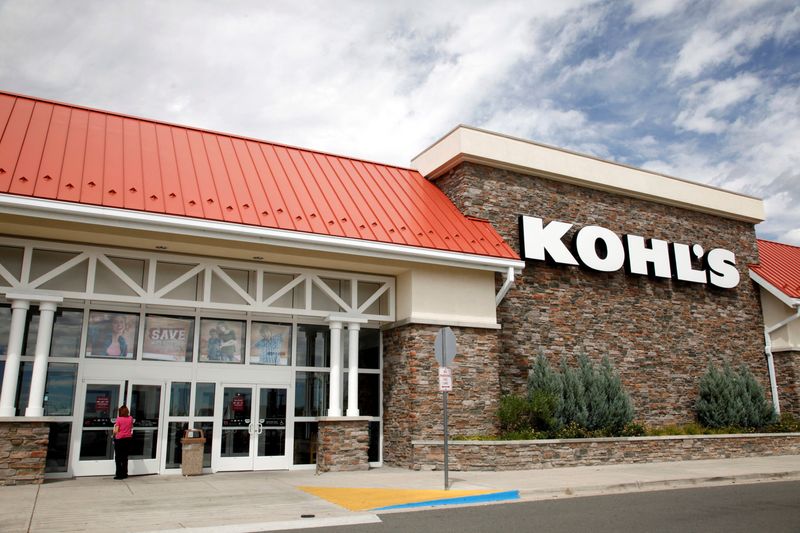(Corrects second-quarter percentage drop in net sales to 8.5%)
By Abigail Summerville and Svea Herbst-Bayliss
(Reuters) - Kohl's Corp (NYSE:KSS)'s reluctance to sell much of its real estate and then lease it back has set up the U.S. department store operator for a new confrontation with hedge funds.
Macellum Capital Management LLC and Ancora Advisors LLC are among hedge funds that have been pressuring Kohl's to cash out on assets and return money to shareholders after launching challenges in the last two years that led to three newcomers joining the company's board.
The stakes are high. Kohl's shares are down 37% year-to-date, double the drop of the broader stock market, as investors fret over its plummeting sales after the Menomonee Falls, Wisconsin-based company unsuccessfully tried to sell itself in the first half of 2022.
Kohl's, whose chief executive Michelle Gass announced this month she is leaving to join jeans maker Levi Strauss & Co (NYSE:LEVI), could be the target of another proxy contest at its annual shareholder meeting next spring unless it can turn its fortunes around, Morningstar analysts wrote last week.
Sale-leasebacks allow retailers to raise capital without shedding stores by selling the underlying real estate and turning them from landlords into tenants. Proponents of this strategy argue the move can unlock hidden value in the company. Critics say the assumed leases are another form of debt that make a company's finances more onerous. They also point out that companies often spend the money on share buybacks and dividends rather than investing in their business.
Kohl's defied Macellum and Ancora last week when its chief financial officer Jill Timm said on the third-quarter earnings call that the company would continue to evaluate potential sale-leasebacks but would not engage in any "transformative transaction." She cited "the market volatility and current rate environment", without elaborating.
The reason that Kohl's board decided against a big sale-leaseback was that it was concerned about the financial impact it would have on its financial health, according to people familiar with the matter who requested anonymity to discuss the deliberations. The board directors who carried out the review were worried that the company's slump in sales would make it risky to add to its liabilities, the sources added.
Spokespeople for Kohl's, Macellum and Ancora declined to comment.
S&P cut Kohl's credit rating to junk in September, highlighting the precarious state of its finances. This happened after its net sales dropped 8.5% to $3.9 billion in the second quarter, as shoppers snubbed it in favor of discount chains and online retailers. Its debt pile as of the end of October stood at $1.5 billion.
Private equity firm Oak Street Real Estate Capital LLC made an offer in September to acquire as much as $2 billion of property from Kohl's and have the U.S. retailer lease back its stores, Reuters reported at the time. It is not clear how many of Kohl's 1,100 stores would have been involved in any deal.
It is still possible that Kohl's, which is in the process of finding a new chief executive, engages in a limited number of sale-leasebacks, as it has done previously. In 2020, it sold and then leased back two San Bernardino fulfillment and distribution centers, pocketing $193 million after fees which it used to shore up its cash position.
At a Goldman Sachs (NYSE:GS) industry conference in September, Timm said the San Bernardino sale-leasebacks were attractive because the leases had a short term of five years that gave it flexibility should its circumstances change. She would not want to take on a 20-year lease as some in the industry do, she added.
"Who knows what in 20 years retail is going to look like. I want to make sure that I do a deal that gives us the financial flexibility to run this company for the long term," Timm said.
Timm added that the 4.5% cap rate on the San Bernandino deal -- a measure of its cost -- was more financially advantageous than a bond Kohl's issued during the COVID-19 pandemic.
GRAPHIC: U.S. sale-leaseback deals - https://graphics.reuters.com/KOHLS-REALESTATE/zjvqjkwzxpx/chart.png
RENT EXPENSES
In a letter to shareholders in March defending its strategy against criticism from hedge fund Macellum Capital Management LLC, Kohl's said that a "large" sale-leaseback would "negatively impact margins by adding unnecessary rent expenses in perpetuity and risk Kohl's investment-grade rating".
It pointed to the example of retailer Big Lots (NYSE:BIG) Inc, which under pressure from Macellum and other hedge funds took on 15-year and 20-year leases for four distribution centers, raising $725 million only to see its operating margins plummet afterwards.
Big Lots did not respond to a request for comment.
In another example of sale-leasebacks adding to a retailer's financial woes, Bed Bath & Beyond Inc (NASDAQ:BBBY) raised $250 million with sale-lasebacks for its stores, a distribution facility and office space, only to subsequently face a liquidity crunch and scramble to find ways to get out of leases.
Bed Bath & Beyond did not respond to a request for comment.
There are, however, examples of companies, such as Life Time Fitness and Walgreens Boots Alliance (NASDAQ:WBA) Inc, that carry out sale-leasebacks without burdening their finances. These tend to be smaller deals relative to their size that allow them to earn greater returns in their business than they do in real estate.
"Generally speaking, I believe a stable retailer with stable management, looking out for the long-term performance of the business, is far better off controlling its destiny than being subject to the vagaries of leaseback arrangements," said Mark Cohen, director of retail studies at the Columbia Business School.
(This story has been corrected to change second-quarter percentage drop in net sales to 8.5%)
